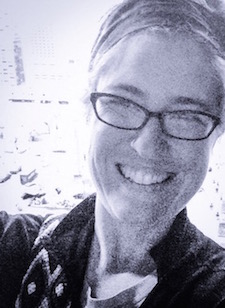This post is part of a blog series on Pomomusings, discussing pastoral identity. To read about the series, as well as get a full schedule of participants, click here.
A Tohu-Va-Vohu Identity
 My pastoral identity is shaped by tohu-va-vohu. Chaos, that is. Tohu-va-vohu, a Hebrew word from the first chapter of Genesis, is thought to be a nonsense word – like gobbledegook. It is translated as ‘formless void,’ an ‘unformed emptiness,’ or, my favorite, ‘a soup of nothingness.’ It is this shapelessness that, in fact, gives shape to my pastoral identity.
My pastoral identity is shaped by tohu-va-vohu. Chaos, that is. Tohu-va-vohu, a Hebrew word from the first chapter of Genesis, is thought to be a nonsense word – like gobbledegook. It is translated as ‘formless void,’ an ‘unformed emptiness,’ or, my favorite, ‘a soup of nothingness.’ It is this shapelessness that, in fact, gives shape to my pastoral identity.
On the one hand, tohu-va-vohu is the crabby, irritable part of parish ministry. It is that unearthly array of clutter on the surface of your desk. It is the head-spinning work of ‘managing expectations’ – like the classic work of helping a parishioner see that it is okay to find a visitor in ‘their’ pew, or carefully disclosing the hard truth that tiny shifts to the worship bulletin do not mean that God is poof gone. Tohu-va-vohu is what makes you, as a pastor, feel like you are watching the reality TV show Parishioners Behaving Badly, instead of what you thought you’d see at church back when you were an idyllic seminarian – the Body of Christ living into God’s call. Tohu-va-vohu will eat up and spit out clergy like no body’s business.
On the other hand, tohu-va-vohu is the reason we do parish ministry. It is the somber chaos of cancer creeping into another life, and the hushed conversation about a miscarriage or a teen suicide attempt. It is what leaves men and woman homeless, helpless or hurting. It is global poverty and drought and abuse. Tohu-va-vohu is what causes the prophets to plead: “care for the orphans and the widows and the strangers†and “do justice, love kindness and walk humbly with God.â€
Formed by all this, my prayers begin at chaos. This emerging prayer practice is evidence that the communion litany is seeping into my soul, rooting me in its sweeping narrative of salvation that begins with God’s spirit hovering over the chaos. Serving communion on Sunday mornings for six years has washed me in the watery chaos, created a tohu-va-vohu identity, so to speak. But, the week-in, week-out experience of parish ministry itself has also called me to pray, “God, let your spirit hover over the chaos of our lives.â€
From the chaos, somehow, trustingly, I can finally hear the rest of Genesis chapter one. God speaks into the chaos and separates the chaos into the poetry of sunrise and moonrise, that liminal space between land and lake, the cacophony of birds squawking and frogs croaking, and so on.
In this ancient creation story that I love, the universe begins with a voice that calls order into the chaos; a voice that undoes the darkness calling out ‘let there be light’ and the light shines in the darkness and the darkness would not overcome it.
Walter Brueggemann writes that in Genesis 1, “God and God’s creation are bound together by the powerful, gracious movement of God towards that creation… and the binding is irreversible. God has decided it… and the mode of that binding is speech.â€
Maybe you already know the binding power of speech, having been offered a job, or received a phone call on your admittance to university, or conducted important business face-to-face; a word and a handshake become the most solid of contracts.
Or, conversely, maybe you have experienced the diluted power of speech in our country, where we are overloaded with sound bites and exist in a culture of it’s-gotta-be-in-writing-before-it-can-be-believed.
But, in an oral culture like the ancient near east, out of which our scriptures come, in this my-word-is-my-deed kind of culture, the power of speech is irreplaceable. It binds together, creates covenant, makes meaning, is legally binding and profoundly life changing. It is in the chaos that God binds us together with a word, untangles us and makes promises to us – that more life might come.
And so, my pastoral identity is formed by the formless tohu-va-vohu, for that is where God speaks.
Katie Snipes Lancaster was dedicated at her grandmother’s the Disciples of Christ congregation in Crawfordsville, Indiana, baptized in the United Church of Christ in Midland, Michigan, and confirmed and ordained in the Presbyterian Church USA in Indianapolis. She quickly identified with the ecumenical roots of Kenilworth Union Church, a congregation in Chicago’s northern suburbs, where she serves as pastor. Alongside parish ministry, she is an aspiring bee keeper, soon-to-be mandolin player and avid follower of YouTube’s VlogBrothers, SciShow and CrashCourse.